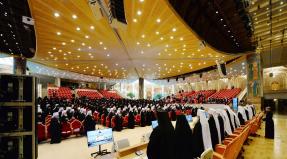Why is faith in God lost? Diocesan monastery in the name of St.
We are talking with Father Tikhon Shevkunov:
- Father Tikhon, where does faith go, where does the need for worship, prayer and joy disappear?
- Once I talked with Archimandrite Seraphim (Rosenberg). It was not long before his death. From the German barons, after graduating from university, he went to the Pskov-Pechersky monastery, where he spent sixty years. He said that the biggest problem with modern monasticism is lack of determination. Probably, this can be said not only about monks, but also about many of our contemporaries-Christians.
Determination, courage and the spiritual nobility associated with them noticeably diminish. But if people with their whole lives understand that the most important thing is to go to God, to be faithful to Him despite any obstacles and temptations, then they do not hesitate in faith so much as to lose it.
The crisis of faith you are talking about is especially vivid in our teenagers. At the age of 8-9, children go to church, sing in the kliros, amaze and touch everyone around, and at the age of 14-16, many, if not most, stop going to church.
- Why is this happening?
- Children were not introduced to God. No, they, of course, were introduced to the rituals, the Church Slavonic language, the order in the church, the lives of the saints, sacred stories, arranged for children. But God himself was not introduced. The meeting did not happen. And it turned out that both the parents and the Sunday school and, sadly enough, the priests built the house of children's faith “on the sand” (Matthew 7:26), and not on the stone - Christ.
How is it that children do not notice God in all the most sincere attempts of adults to instill faith in them? How is it that a child does not find the strength to discern Christ the Savior in his childhood life, in the Gospel? Answering this question to ourselves, we raise another adult problem, which is reflected in children, as in a mirror. This is when both parents and priests teach one thing, but live differently. This is the most terrible blow to the tender forces of children's faith, an intolerable drama for their sensitive consciousness.
But there are other examples as well. One could cite another, but this one is especially memorable for me: in 1990, during my first trip to Germany, to my great surprise, I received a good lesson from a priest. Catholic. I was amazed by his flock - very clean young people of 16-20 years old, sincerely trying to live a Christian life. I asked this priest how he manages to save these teenagers from the aggressive pressure of temptations and the pleasures so familiar to their peers in the West? He then looked at me in complete disbelief. And he said the words that, with their simplicity and clarity, then simply crushed me (I am very sorry that I did not hear this from an Orthodox priest): "Yes, they just love Christ more than all these pleasures!"
- We have a different situation?
- Of course not! We also have many bright examples, thank God. In our Sretensky seminary, I see amazingly pure and sincere children, although of course there are all kinds of temptations, life is life.
- But these are teenagers, and people who came to the temple in adulthood?
- What's the difference? Something similar happens with adults. We also seduce each other (in this case, "these little ones", about which the Savior speaks - not necessarily children by age) with our lukewarmness, deliberate violations of the Gospel commandments, and an unclean life. Gradually, people get the idea that a Christian can live as he pleases. And if this happens, people who have come to faith already in adulthood gradually lose interest in spiritual life, they become bored with everything. There is no real communication with God, which means there is no spirit life. The first three years of faith, Orthodoxy is interesting, new life captures and brings a lot of new impressions, and then everyday life begins.
Probably, it's like in family life. Then you need to work, endure, endure, first of all yourself. It's really hard. And people who have come to faith, say at the age of 25, still have fifty years ahead of them. It has always been, no need to be surprised. Such dryness is usually an inevitable stage in spiritual life. For example, St. Theophan the Recluse writes a lot about this and is interesting. This section of the path is a desert that must be overcome. Unfortunately, not all of our brothers and sisters follow this path. And some even forever and with great pleasure dig themselves into these barren sands and it can be very difficult to pick them out from there.
- What causes this dryness? A person does everything that is supposed to be - goes to confession, lists the things that he knows are called sins, reads the rule, proceeds to the cup, and the further, the more it seems formalism, the more mechanical actions in this "read", "defend "," Say in confession. " What to do? How is it correct?
- The Holy Scriptures very definitely say how to revive the soul, how to make the soul become young and alive again. "Seek God, and your soul will live." Seek God no matter what! Stubborn and persistent. And then the promise of the Lord Jesus Christ is fulfilled: "Seek and you will find."
But if there is no search for God, if the hunger for God, the desire to comprehend Him disappears, this is a cause for very serious anxiety. We must work hard with all possible means to restore this desire in our soul. Without this, nothing good will happen. Or, in the best case, you will have to wait, like a saving rain on a parched earth, shocking soul trials, illnesses, grievous wounds and temptations.
- But is it possible for a layman?
- To laymen? Yes, it is possible for them! As Father John (Krestyankin) said, in our time strong Christians are saved in the world, and weak Christians in a monastery. When you stand in confession, communicate with parishioners, you see what amazing devotees there are among the laity, how we, who call ourselves monks, need to learn from them.
I remember once in the mid-80s I was walking with Fr. John (Krestyankin) through the Pskov-Pechersky Monastery. Suddenly, an agitated young man “pale with a burning gaze” ran up to the priest and began to complain loudly: “Father, Moscow is such a disgusting city, a new Babylon! People are godless, terrible! "And suddenly Father John barred his mouth with his hand and sternly said:" What are you saying? In Moscow, 40 Divine Liturgies are celebrated every day in forty churches! Such amazing ascetics unknown to the world live there, somewhere on the 8th floor of a 12-storey block building! True saints that you cannot even imagine. " I was surprised then, because I thought that all the ascetics lived only in remote monasteries, somewhere in Solovki or in Egypt. And now - and indeed - I myself see amazing ascetics - ordinary laymen who teach and save me by humbling me, showing how it is possible in our time to live truly ascetic, in a Christian way.
- What is this Christian life?
- In the fulfillment of Christ's commandment to love God and neighbor.
These are ordinary people - women, boys, girls, mature men. I’m not talking about grandmothers who follow such prayer rules, which, to tell you honestly, makes the monks feel uncomfortable. Moreover, they have been following these rules regularly for decades. And with complete confidence that they are not doing anything special! She reads so much kathisma for the eldest son, so much for the middle, so much for the youngest daughter. Moreover, he reads one and a half thousand Jesus prayers in order to feel at least a little bit of his sinfulness. Moreover, prayers by agreement and an akathist - how could it be without it ?! This I am telling you the real prayer rule of our real parishioner. And such ascetics and ascetics are innumerable! Plus, they, just in case, work, go shopping, iron, wash, raise children and grandchildren. And they are not proud, they are not conceited, they impute themselves to nothing, they are ready to serve their neighbor at any moment. Just communication with such people is an amazing help to us, who have become impoverished in faith, in hope and in determination.
- But is it not in reading prayers that true Christianity is?
- Of course, not in the reading of prayers. And in prayer as in living communion with God! You just need to understand that the form of prayer can be very different. The Holy Fathers believe that spiritual life is determined precisely by the quality and purity of prayer. But, it goes without saying that if a person thinks that he is praying, and at the same time he is angry, does not like people, then he can only be pitied. But you know, maybe I'm lucky, but I haven't met such people for a long time.
- There are many examples when young people serve in the church, and their families do not see any help from them ...
- Well, it happens that a person, as they say, "zakronstadt". He begins to delve into spiritual life and goes to a bright goal, stepping over his unfortunate loved ones. There is a confessor for this. There is a time. There are misfortunes. There are finally falls. But I would not begin to present such sad cases as the norm of today. Rather, I think it's such a childhood disease. Many have had chickenpox, but not all are pockmarked.
- But such negative cases are on the lips of many today ...
- Now, in a certain sense, it has become good form in Orthodox circles to say that a person has prayed: he reads the rules, canons, kathisma, is too pious. This is pronounced as a diagnosis. But we do not take on the role of judges for the most part out of an excess of the gift of spiritual reasoning. And more often from our own lack of faith, laziness and selfishness. It is for the purpose of self-defense of our lazy peace that an image is deliberately drawn - a kind of Ferapont from The Brothers Karamazov, remember, there was such a cruel and unwise ascetic in Dostoevsky.
You know, but there is a great danger in the fact that we willingly exaggerate and inflate such painful moments and with these examples we begin to defend our negligence and lukewarmness, unnoticed for ourselves. And in general, in the church environment, such evil and incorrect stereotypes began to spin more and more in their generalization: if church women are evil witches, if young people are notorious, if adults are losers, if altar men, then they left their family for the sake of the church, if monks, the money-grubbing and the wicked.
- But it really does sometimes take place ...
- Who can argue? This is not to say that this is not at all, that this is not true. But why persuade ourselves and others with perseverance worthy of a better application that this state of affairs is a feature of our Church?
I once traveled through Orthodox forums, and it just became uncomfortable with what cynical malice Orthodox people, who consider themselves very churchly educated, relate not only to the clergy, which they generally do not value, but also to the most pious laity ...
- They say: "Orthodox" and "Orthodoxy of the brain" ...
- These terms, I'm afraid, did not come from anywhere, but from the Orthodox environment. Because only “their own” can in such a sophisticated manner. However, be that as it may, but they were picked up in our midst with enthusiasm. But this is a truly alarming phenomenon in our Christian community. In addition, gradually we ourselves begin to look at ourselves and those around us precisely through the prism of such derogatory ideas.
“Has it become… noncomilfo to act in accordance with traditional piety?”
- Remember how Tolstoy in Childhood, Adolescence, Youth remarkably talked about comme il faut, how comme il faut ruthlessly influenced his life. Now (fortunately only in church circles, because it is simply impossible to call such people church people), an Orthodox comme il faut is being developed, and if a person does not fit into it, he is an outcast, a completely despicable person.
So we come to cynicism, and in fact to the origins of the very disease of lukewarmness, which has infected Christians since the time of the Laodicean Church. The enemy force, which begins to be whipped up by spiritually cooled Christians from within the Church, is infinitely more dangerous than any external force than persecution.
We teach our students not to become "Orthodox comme il faut" in any way, because they themselves will not notice how they lose faith, how they become careerists, how all values \u200b\u200bin their lives will absolutely change.
People of the older generation often get together and say: "How great it was in the 60s and 70s, what a faith it was!" We say this not only because we are starting to grow old and grumbling, but because it really is. Then there was an external opposition to the Church from the state, but we were together and cherished everyone. "Orthodox" - it would certainly be something from the camp of the enemy. Only Emelyan Yaroslavsky could tell about the Orthodoxy of the brain. An Orthodox person would never have used or repeated such words, such expressions. And now you can hear it in the church environment, they flaunt it, they are proud!
- Why does such an attitude arise?
- What's happening? People entered the Church, but only partially loved it. And gradually, over the years, in the secret of their souls, they realized the terrible truth: they treat Orthodoxy with the deepest contempt. With them begins a terrible disease of treacherous cynicism, akin to the act of Ham. And people around them get infected with this one way or another. But we really are a single organism - the Church, so this disease must be resisted somehow.
When the Orthodox faced this kind of thing in the Soviet years, they understood that it was "from our enemies," "from the adversaries." Now the lessons of contempt and arrogance are increasingly being taught by church people. And we know the woeful fruits of these lessons.
- A sad forecast ...
It remains to recall only the words of St. Ignatius, who said that "The apostasy was permitted by God: do not try to stop him with your weak hand." But then he writes: "Get away, protect yourself from him." Don't be cynical.
- Why? After all, cynical judgments are sometimes well-aimed ...
- Sobriety and witty taunts, when a fool or an impudent person is put in place, when they want to protect someone from excessive enthusiasm - this is quite acceptable. But cynicism and Christianity are incompatible. At the heart of cynicism, no matter how it justifies itself, there is only one thing - disbelief.
Once I had the opportunity to ask the same question to two ascetics - Father John (Krestyankin) and Father Nikolai Guryanov: "What is the main disease of today's church life?" Father John answered immediately - "Unbelief!" "How so? - I was amazed. - And the priests? And he answered again: "And the priests have unbelief!" And then I came to see Fr. Nikolai Guryanov - and he told me completely independently of Fr. John said the same thing - unbelief.
- And disbelief becomes cynicism?
People stop noticing that they have lost their faith. Cynics have entered the Church, live in it, are used to it and do not really want to leave it, because everything is already familiar. And how will they look at it from the outside? Very often cynicism is a disease of professional Orthodoxy.
- But sometimes cynicism is a defensive reaction of a very vulnerable, insecure person who has been offended or seriously hurt ...
- How, for example, is the exhibition of "forbidden art" different from the painting by Perov "Tea drinking in Mytishchi"? In the forbidden art, disgusting cynicism, and in Perov - exposure. Pain and chastisement for which we should only be grateful.
And the ascetics could say very harshly, for example, the monk schemaeromonk Lev of Optina. Even today we have a wonderful archpriest in Moscow who can joke so sharply that he will not seem like a little. But it would never occur to anyone to say that he is a cynic, because there is no malice in his jokes.
- Reading the memoirs of M. Nesterov, I all the time caught myself thinking that he would certainly be ridiculed today. For example: “Mother was at Iverskaya. They stole a bag of money, but she kissed it ”- everyone will say right away, here, Orthodox ...
- Twenty years ago we would have said about such a person: "Lord, what faith, how good!" And today, the prosperity in relation to the Orthodox faith has turned out to be a considerable test for Christians. Remember, in the Apocalypse: “For you say:“ I am rich, I have become rich and I have no need for anything ”; but you do not know that you are unhappy, and miserable, and poor, and blind, and naked ”(Rev. 3:17). We have become impoverished in faith, and therefore many people, looking at us, get tired of being Orthodox. They are still walking by inertia, by first love, they still remember how much they received in the Church and still hope to receive grace.
- How can you correctly orient your spiritual life?
The most joyous thing in spiritual life is to discover new things for yourself. Remember with what joy you woke up on Sunday morning for the Liturgy, how you read avidly of the holy fathers and all the time discovered new things for yourself. If the Gospel does not reveal anything to us, it just means that we have closed ourselves to the discovery of something new. Remember the words of Christ to the Ephesian church: "Remember your first love."
In 2015, 24,982 Russians decided to voluntarily die by committing suicide. Reasons - from dismissal to treason. However, they are only what lies on the surface, an excuse that pushed a person to a fatal step. The reason is deeper: 99% of suicides are people who have lost hope and confidence. How not to lose faith in yourself, not to allow circumstances to break the inner core, if everything is crumbling around?
Why do people lose faith in themselves?
Faith is confidence in the invisible. A person's belief in himself builds up over the years, starting from early childhood. Alexey Nemov, the author of a popular textbook on psychology, notes that a person's confidence is formed by social institutions:
- family;
- preschool institutions;
- educational institutions;
- place of work.

The environment has a huge impact - it is much easier to believe if you are sure that you will be supported and helped, and not tripped when you don't expect.
Many insecure people carry this insecurity from childhood. “You are no good for anything,” the father says to his son. "You have to lose weight by all means, otherwise the guys won't like you!" - the mother teaches her daughter. And they do not realize that in 45% of cases, complexes and insecurities inherent in childhood will pass with a person through their whole life!
Everyone can name many such examples from personal life. Hence the rule that must be followed, applying to oneself and raising children in this way:
If you fail, you need to learn a lesson from it, finding the positives, creating a situation of success.
This simple rule will help you maintain confidence and consistently pursue your goals with a positive attitude. Remember, however, that self-confidence and self-confidence are different things. Faith helps you achieve goals that you can do, while self-confidence pushes you to reckless actions that are doomed to failure.
How not to lose faith in yourself?
Think about what can "unsettle" you and make you give up? Sociologists have compiled the sad top 10 events that influenced the self-esteem of those who fell into the grip of depression:
- Death of a loved one, a loved one.
- Betrayal of a marriage partner, family breakup.
- Disappointment in a loved one.
- Absence of a pair for a long time.
- Job loss.
- Business failure.
- Collapse of hope for something.
- Inability to meet someone's requirements.
- Serious illness.
- The ridicule of others.

These events "break" our compatriots, forcing them to lose faith in themselves. Alas, no one is immune from them. Moreover, millions of people around the world face them every day, but they are not fatal for all. How to keep from the collapse of faith in yourself?
Again, psychologists come to the rescue: they suggest following simple rules that are formulated after analyzing situations in which people managed not only to maintain a positive attitude, but also to emerge victorious, no matter what!
Did you know?
- Napoleon was short and his family was in trouble with money. In this regard, he was constantly ridiculed by friends.
- Albert Einstein's teachers were considered mentally retarded, which greatly affected his certificate - he was a poor student.
- The world famous Sony corporation started out with rice cookers. The model was unsuccessful, and the rice was constantly burning there, and therefore its founder suffered huge losses.
- Bill Gates was dropped from Harvard.
- One of the classics of English literature Jack London tried to publish his first book ... 600 times! And he got rejections all the time.
This listing is endless. Hence the conclusion: failure is not a reason to give up, because working on mistakes can change people, bringing outsiders into leaders. Even if it is very difficult, be sure: what does not kill makes you stronger and more confident in yourself!
What to do to stay confident no matter what
- Remember that nothing lasts forever
According to legend, on the ring of King Solomon, famous for his wisdom, the text was engraved: "Everything passes." When it is completely difficult and it seems that you and your personality are not worth anything - remember that recessions are replaced by ups!
- Don't let the world put pressure on you
Do you know why there are so many people today who are successful but not happy? Because they do not achieve what they need! The media does not make a person out of a person, but a consumer. And in the pursuit of benefits, we begin to lose faith in ourselves.

“I cannot buy the latest modification of the iPhone,” you sad, feeling like a failure. Your neighbor Tatiana, having a cherished iPhone, is sad that there is not enough money for apartments ... And everyone forgets that the basic law of economics says: "Material human needs are insatiable." Therefore, do not tie self-esteem to income level! Do not forget that many great people did not have wealth: Socrates, Diogenes, Eminem, Yesenin and many others. Therefore, wealth can in no way be an indicator of value for society!
- Surround yourself with like-minded people
You should not overly listen to the opinions of those who do not share your ideals - this will certainly lead to conflict with yourself and negatively affect self-esteem.
- Prioritize correctly
It is impossible to achieve everything at once. Therefore, from time to time you need to stop and think: “What do I want to achieve? What can I sacrifice for this? "
- Don't ignore "correcting mistakes"
If everything has already happened, it is too late to do anything. But it is never too late to recognize the mistakes in order to avoid them in the future.
These tips are exactly what you need to do if you have lost faith in yourself.
As a minimum goal, I would like to give some encouragement to those present here about spiritual crises. That it is hard, it hurts, since there are these experiences. But without this it is impossible. And this gives, by and large, the opportunity to acquire everything that was said in all previous speeches. Becausecrisis is an opportunity... Everything that we have in general develops with the help of crises: our personality, relationships with other people, our worldview. That is, a crisis is an opportunity to get a qualitative leap in a short time, to get radical changes. Only this gives us a chance to move to a higher stage of development. But it does not give a guarantee. And, in fact, in every crisis we have a danger instead of going through it and getting up, or hanging in our experiences, or falling into the abyss of despair.
Benefits of the crisis
How is the crisis useful? Firstly, this is the best and fastest way to destroy the attitudes, habits that limit our development. In a crisis, some part of us always dies. This is such a small death. But that which has already interfered dies, that which has already become obsolete dies. The crisis raises awareness. Pushes us to choose life strategies. Many people find it difficult to make choices, postponing them, or shifting responsibility to someone else. But sometimes in our life there are situations when we cannot evade.
And finally, crises don't just happen. They are preceded by a long latent period when internal conflicts are growing in us, which we try not to realize, not notice, not even admit to ourselves, hide them from others. And at some point, when this conflict becomes unbearable, as it seems to us, everything is crumbling, the ground swayed under our feet, it is not clear what to trust in this life, maybe everything that we believed in seems to us not true. But after this period of confusion, suffering, and sometimes even despair, we find that the conflict to which the crisis brought us was resolved in the process of experience. That is, it is like a thunderstorm. It is pumping, pumping, and now: thunder, lightning, and then the air is clean and fresh.
There are many different crises. There are age, there are personal. What is the peculiarity of a spiritual crisis? First, it encroaches on the very foundation of our being. That is, we are losing our ideological basis. We cease to understand the meaning of life. I can't say that we understood it before, but in the calm periods of our life we \u200b\u200bstill have a certain sense of purpose, meaning, which in moments of spiritual crises seems to us to be untrue. Sometimes it turns out to be false. Sometimes this manifestation of despair and crisis simply helps us cleanse our understanding of all the husk, garbage, prejudices, other people's or our own ridiculous opinions that have overshadowed our meaning so that it ceased to inspire us.

Features of the spiritual crisis. Frame from presentation
In a spiritual crisis, our spiritual life is suspended. We feel the damage to the processes of spiritual search, we have the feeling that we were going somewhere, going, going, and suddenly the road disappeared. Or there, he went out on deck, but there was no deck. But it helps us to get together, helps us to be more alert, helps us to look more soberly, first of all, at ourselves and at the surrounding reality. And this suspension can be very useful in order to correct your paths. And finally, a feature of the spiritual crisis of a believer: if a believer experiences a crisis, all his previous religious experience is devalued. I emphasize that we are talking about one aspect of this vast topic: the spiritual crises of those who perceive themselves to be believers, and specifically Christians. Because some spiritual crises are experienced by esoterics, some spiritual crises are experienced by people with an indefinite idea that there is some kind of "higher power", but let's talk about what unites us with you.
And this crisis leads to the rejection of any religious practices at all, sometimes leads to their rethinking.
Consequences of the crisis
As soon as we lose the ground under our feet, as soon as our worldview has collapsed, existential anxiety breaks out from under it. That is, the four most powerful fears of our existence - these are death, freedom, loneliness and meaninglessness are always waiting for us. And, in fact, the horror that is created in aggregate when we find ourselves face to face with him prompts us to quickly look for new meanings.
What are they opposing? Death challenges our desire to be. That is, the irrational fear of non-being undermines the very basis of our existence, making it unreliable, making it random. And it is not clear whether he is, or we are no longer there.
Freedom. Well, it always says: "Freedom is so wonderful, you have to strive for freedom." Why is this fear? Because we all need at least some kind of predictability in the world. We all need structure. And most of our lives we live with the feeling, for example, if we are believers, that the Lord wisely created this world, that God's providence for us leads us in one way or another, whether we understand it or not, that we are in this world, firstly , we are not responsible for everything, and secondly, we are part of a certain Great Plan, a certain larger whole. But when we feel the existential fear of freedom, then there is just a feeling that there is no structure, that we are walking like a tightrope over an abyss, and everything that happens to us depends only on us. And the measure of responsibility may be overwhelming.
Loneliness in an existential sense is a sense of one's own isolation. We are born alone and alone we leave this world. In ordinary periods of our life, we cover this with the need for contact, the need for protection, for affection, for belonging to something greater. But in the moments of crisis of our existence, we feel that in fact there is nothing between us and the horror of being, when there is no God there. We find ourselves alone with the abyss. And finally, when we lose our previous spiritual meanings, we feel the complete emptiness of life, because the need for purpose and meaning is also the basis of human existence.
Causes of the crisis
Why is this happening to us? In what situations does this happen? A very common reason is disillusionment. First of all, illusions about yourself. We often, I would say, almost all the time, and God forbid we get rid of this at least to death, we perceive ourselves mythologically. We consider ourselves "someone". We see opportunities, talents in ourselves, we have certain claims. We have a certain sense of our own worth, more or less adequate, or completely inadequate. But one way or another, some kind of illusion about oneself always accumulates. And in moments of crises, all this heap of illusions falls apart. And we are forced, on the one hand, to reassemble ourselves, and on the other hand, to remember who we really are. Or maybe not remember, but understand, gradually become aware.
Destruction of illusions about God. Often the image of God is distorted. That is, we seem to be believers, we believe in God. At some point, the feeling may arise: “Where is my communion with God? Where is the love of God that everyone is talking about? I have been praying into emptiness for twenty years, I don't hear anything, they don't answer me from the other side. And in general, it is not known whether there is a God or not ”. Or vice versa: “I was afraid of God for thirty years, but now I understand that one of my actions is more terrible than another, but why does not He correct me, why does He not stop me?”. In fact, at such moments, a person often realizes that he was not worshiping God. He really worshiped some idol that he invented, which he put in the place of God. This is a terrible experience, but spiritually beneficial.
And, finally, the collapse of illusions about the Church. Because there is an expectation that we will come to some beautiful place where everyone loves each other, where there is already paradise, and almost everything breaks down on church realities. And this experience also has to be dealt with.
Another group of reasons are events that have significantly changed our lives. This is a real personal crisis, which entailed a spiritual crisis. I put the death of loved ones in the first place, because this is always a moment of rethinking my own life too. And very often, especially when the death of loved ones is sudden, under tragic circumstances, when children die, people feel that everything is. They believed, hoped, prayed, but all hope turned to dust. Accordingly, everything that was before has depreciated. As well as their own serious illness, especially an illness that is life-threatening or incurable, or a sudden disability makes a person feel fragility, vulnerability, and that life is not at all like he thinks. That is, something needs to be changed. When a person loses his life's work, when various troubles associated with his professional vocation happen to him, his self-identification associated with the previous one was based on this, and suddenly it collapsed. And we have to do something about it. The only thing that can be done with this is to understand: how to live differently now, and to understand the meaning of the tragic events that have taken place.
The change in the material level, I want to say right away, both in the smaller and in the larger direction. Sudden impoverishment and sudden wealth are equally destructive to the spiritual life. Equally pose us with the threat of a spiritual crisis. And relationships with other people. Due to the lack of space, I indicated only betrayal, but in fact, these are some serious grievances, that is, when our trust is deceived in the most cruel way. And this casts doubt on our trust in all other aspects of our being, especially when really all our hopes are focused on one thing, and suddenly it didn't work.
And finally, sometimes it happens, more precisely, it happens quite often that the crisis creeps up to us gradually. Like that frog in boiling water, which was placed in cold water, slowly heated, and finally, it boiled, not noticing the moment when it was necessary to jump out.
Very often, if we are talking about our Orthodox environment, the cause of the spiritual crisis, at least subjectively, is perceived in this way, these are all sorts of negative phenomena of church life. The practice does not correspond to the teaching, they expected one thing, received another. This is no longer a disappointment in the church, as in some earthly institution, or even in a divine-human organism, it is a concrete insult that we have this bad and that bad. And so we have to leave here. The reasons are not only external, but also internal. That is, a false understanding of spiritual life. That is, a person has built for himself some kind of, perhaps, the author's Orthodoxy, maybe there is a whole group of such comrades there, or maybe they have such a spiritual teacher. And at some point it becomes clear that it was all a mistake, a lot was a mistake. Here, people with uncritical thinking and such literalism of faith are in greatest danger. Example: If a person literally believes in Six Days, then when faced with convincing evidence of evolutionary theory, he loses faith completely. Not in Six Days, but he loses faith completely. That is, the tougher our belief system, the more rigid it is, the more destructive any blows to this belief system. Critical thinking is very protective against such spiritually deplorable circumstances.
And, finally, traditionally, we will talk about this a little later, but it is often said: “If a person has a spiritual crisis, it means that he has unrepentant sins,” which, on the one hand, is often the very person who is rejected in a crisis. it is perceived as "it is his own fault", but on the other hand, from patristic creations, and from our own experience, if we honestly analyze it, we know that it often happens that way. And it is the crisis that allows us to notice this. Again, how is it useful.
And finally, a systemic conflict, that is, a conflict of relations, a conflict of concepts. Any confrontation with people who are significant to us, or any contradiction between family and faith, between work and family, lingering contradictions drive us into a dead end.
Stages of a spiritual crisis
And how to unfold the process of experiencing a spiritual crisis? As I said, internal contradictions are growing, but we try our best not to notice it. But we do not notice this with the mind. And we feel it in our hearts. That is, emotional instability. We are getting worse, but intuitively realizing that the very foundations of our existence are now shaking, we resist these changes. Very often the moment of crisis is delayed as much as possible, and the more we delay it, the harder then the experience of the second stage, namely the destruction of the worldview, ideas about oneself.
The second stage is very painful, because the maximum suffering falls on it. We realized that we could not hold on to anything, we realized that everything, the world will never be the same, and we ourselves will never be the same. Maybe at this moment we feel that we have lost faith. Or maybe we feel that we have not lost our faith, but we do not know anything either about ourselves, or about God, or about this life. We are naked and on swaying ground, and we need to get out of this somehow. Therefore, it is natural that there is suffering, confusion, there is a lot of fear, there is a loss of meaning, and yet we have not yet accepted this state enough to start looking for this meaning, this is still ahead of us.
But no suffering lasts forever, and at some point there comes a pause, when we are already accustomed to the fact that we are in a situation of complete uncertainty in the spiritual sense, but we understand that since the old models do not work, and the new ones have not yet taken shape, not created, we need to make some kind of volitional effort in order to get out of this crisis. That is, we include critical thinking in this situation to the maximum. If at the moment we are capable of prayer effort, accordingly, we also call on God's help. The main challenge is to ask the right questions. This is a revaluation of values. Let us not have answers, the main thing is that the questions are correct. And this will allow us to move on to rethinking and creating. That is, when a new understanding suddenly crystallizes from the fragments of our previous worldview, or perhaps from the dust it turned into. We see the light at the end of the tunnel, the way out of the impasse, we understand how we need to change our way of acting. It is clear that these changes do not happen instantly, but at least the direction has already been outlined.
I want to say right away that this process does not happen automatically. With a pathological experience of a spiritual crisis, one can get stuck at each of these stages, including the first. That is, if suddenly one of you is sitting and thinking: “Well, thank God, there have never been any spiritual crises in my life,” you know, I have bad news for you. This means that you have been in a state of increasing internal contradictions and resistance to changes for an unknown number of years. Because even if we remember asceticism, that in spiritual life, first grace is given to us, then we lose it, and then, having passed a difficult path, and gaining humility, we return it. Some people spend their whole life on this, but by and large the situation of a spiritual crisis is also described.
Well, according to the experience of many of us, we can repeat this cycle many times in our life. That is, at some point we feel that we have already returned this grace, and then again we lose it, relaxing. And then, when a person has some experience, at least he is not afraid. He knows that this destruction of the worldview is not irreversible, that this is the period of such a reformatting of his own personality, getting rid of everything unnecessary.
How to help a person in crisis
And how can a person be helped in experiencing a spiritual crisis? Thank God, in fact, we are not alone in this world. Even if we acutely feel existential loneliness, there is a high probability that there are our loved ones next to us, there are brothers and sisters, of course. There are shepherds. And it rarely happens that absolutely everyone has the same state of crisis at the same moment. Someone feels more stable at this very moment. I'm not saying he is right. We never fully know who is right and who is wrong. We all know some truth; none of us knows the truth. But emotional stability helps a person in a state of crisis simply to support, because all that we can give a person is a little bit of resources in order to cope with existential threats. So that he doesn't feel lonely, so that he doesn't feel lost. To make him feel elementary that he is there who is (indecipherable). That is, emotional support, acceptance comes first. Because the words at this moment will be difficult to understand, or you will say the same words, putting different meanings into them.
Second. Support his reflection, help him get out of a state of complete collapse to attempts to find a way out of the impasse. Here it is very important to listen, talk, share some of your experience, but to do this is not edifying, but as non-directive as possible. Any pressure at this moment drives the person into an even more severe crisis. You can discuss (unintelligible), but you can offer your own ideas for understanding. But these ideas should not sound like: "Well, I had that, I also doubted it." That is, not to devalue his suffering, not to devalue his thoughts, not to devalue his intuition. Because you cannot know how important it is for him, how much it hurts for him. Accordingly, when we ourselves find ourselves in a spiritual crisis, we want to hide in somewhere and wait it out. But we still try not to forget that we are not alone in this world, and not to refuse help, support from those who are near, and it is not so easy to find the strength to ask for it. And I already ran a little ahead.
How can we prevent a person from getting out of the crisis? Well, first of all, start judging him. To accuse him of lack of spirituality, to tell him: "It is my own fault", "This is all for your sins", "Yes, this is because you are such and such." It is very harmful to name the only correct opinion. It does not matter whether he found himself in this crisis precisely from this opinion, or from some other, because in this state, a person more than ever sharply understands that all opinions are subjective. He just feels it with his skin. It is this feeling of instability that makes you very, very critical to listen to any peremptory opinions expressed.
Refusal to communicate, alienation. Say: “Well, okay, you’ll sort out your doubts there, then come. It's hard for me to talk to you. " Everything, you pushed him into loneliness.
Way out of the crisis
It is clear that there may be three ways out of the spiritual crisis, this rethinking and reassessment of values, and the resulting new worldview.
Firstly, as a good option, if the crisis is related to our faith, we can rethink the tradition, we can rethink our beliefs, we can get rid of everything superficial, from everything superfluous, from everything superstitious, from prejudices, from dubious, even widespread opinions. And by and large, strengthen your faith. Come to a deeper, more sincere faith.
The second way is to de-church. A person abandons religious practice without giving up faith. For example, he starts (indecipherable) and look for alternative ways.
Finally, the option is the toughest. This is complete disappointment, loss of faith. As in the mild version: “I am an agnostic, and I don’t want to think about it,” and in the version of such militant neurotic atheism. As a person devoted himself to religion, so with the same passion he devotes himself to the struggle against religion for years.
Why is this happening? And this happens because the usual, already established church tradition is built on actions that prevent overcoming the crisis. A person who openly expresses his doubts, or expresses some alternative ideas, begins to be interested in something that does not quite correspond to the church understanding, the first thing he encounters is condemnation. Then they try to either re-educate him, or they immediately anathematize him. And in fact, people who operate in such a paradigm are pushing those who find themselves in crisis to the most severe way out of the crisis. Especially in those cases when critical thinking has not been formed before, and this is, so to speak, the first steps to critically rethink. That is, the first steps in spiritual sobriety, speaking in spiritual terms.
And second, they push themselves to resist change even harder. That is, in fact, they interfere with their own understanding, their own awareness. That is, those who are in a crisis have a chance. Yes, even through torment, but to come to some deeper understanding, and as a result, to a deeper faith. Because not one of our spiritual states, while we are alive, is final.
How can we change spiritual practice in the Church to help people get out of crisis?
And since we have no time left, the question is. But this is rather a reflection. Do you think that we, as members of the Church, could change this situation in order for a spiritual crisis in our Orthodox Church to be (undefined). For each of us, since each of us periodically finds himself in it. It can be very strong, it can be smoothed out, but it happens nonetheless. So that a spiritual crisis for us is not a risk to the temptation of our faith, but an occasion for our loved ones to support, strengthen us in this state, and so that this really serves ultimately to strengthen our faith. But, you know, since there is no time, I will ask this question to our esteemed rulers, because it is from the “princes of the Church” that we expect instructions on how we can change our church practice so that people who find themselves in a spiritual crisis do not receive condemnation and pushing and pushing them to leave, to the destruction of faith, and support that would help them to rethink everything and deepen their faith?
Bishop: Natalya Stanislavovna, the main pathos of her speech was aimed at ensuring that help was primarily from the church. For the church to change. I understand from her speech.
The question was how are we, each of us as a member of the Church ...
(indecipherable)
Bishop: The first option that comes to my mind is to start myself, from the very person who is prone to such crises. Because immediately to educate all the clergy, all the laity that we have in the church, so that they understand that every person must have crises, that they look like this, they have such a manifestation that in this way you can help a person ... Such, say, an educational program to do, and moreover (indiscriminate), so that they receive some practical skills, starting with bishops, ending with church people ... (unintelligible)
So, the first thing, in my opinion, that can be done (indecipherable) is for a person to understand very well what is happening to him, what can happen to him. Start with yourself (indecipherable). You are to blame for what is happening to you, you yourself are to blame for this (indecipherable).
There are some objective laws of the state of the human soul. There are objective stages in his church path. In order not to stumble here, (indecipherable) you just need to know them.
Then, you know, it seems to me that the basic safety technique (indiscriminate) and my personal experience, and the experience of those people with whom I came into contact, you need to understand very well what the Church is and why you came there. In my life in the Church I have met very different people, very much. And with different situations (indecipherable). But never, never in my life, no situation, no one made me doubt that the fact that I am in the Church is right, that I have chosen the right path. Maybe I'm so stubborn, stubborn ... I'm stubborn. (unintelligible) I understand very well that the Church can give me salvation, the Church has everything for this. Nothing prevents me from being saved. In the Church there are sacraments, in the Church there are divine services, in the Church there are the works of the Holy Fathers. If you need personal communication, I can (indefinite).
Everything that comes up against it has never made any impression on me. Because I knew that it was not in the Church, but outside the Church (unintelligible) it did not concern me much. No, no, it was! Of course it did! I had to overcome it, fight somehow, do something there in order to somehow get around it, especially when I was a bishop, because (unintelligible) I had to somehow cope with it. Natalya Stanislavovna has been in contact with me for many years, and she knows what I am talking about. But somehow it had absolutely no impact in terms of hesitation, it didn't have any effect on me. Here is the Church, and I (indecipherable). Everything else (indecipherable) Here, you know, something like that. Nothing in the Church prevents me from being saved. Absolutely nothing. So it seems to me. the first is human knowledge. A person must know that he has such periods, must know how they manifest, must know how (indecipherable). Because forewarned is forearmed. And second, do not confuse what is not the Church and the Church. Yes, my father met, a drunken pop. But this does not mean that God (indefinite).
This does not mean that the Church does not exist, that one must leave it. Do not communicate with these people! Do not go to this temple if suddenly you do not like it in some way.
N.S.: Vladyka, excuse me, but some understand by “do not associate with these people”, for example: “leave this church for some other”. "Do not associate with all these people, this is a false church, but somewhere there ...".
Bishop: In order to draw such a conclusion, you need to communicate with all Orthodox people of the entire Russian Orthodox Church, to make sure that they are all like that. Then - go away. We need to communicate with everyone, up to His Holiness the Patriarch. And to see that they are all like that - then leave. With whom to communicate then? But I would stay in this case too.
N.S.: On my own behalf, I can add that I had very tough periods of doubt, but I consoled myself with this famous story of Boccaccio about how a Jew was baptized, that “since everything is so bad, but still the church is growing and strengthening, it means that the Holy Spirit supports it ".
Bishop: Probably, and so you can console yourself.
And five minutes of questions. Then we will have to leave, our time in this hall ends.
I will remember my experience of going to church. I was at a service in the Murmansk region, and there was no priest to teach me, and I began to read Orthodox books. And so, then I came (unintelligible) came to Omsk, and I go to the church to submit a note. And I hear they advise me: "You give a note to this priest, but don't give it to this." I was surprised: what does the father have to do with it? I'm giving notes to God! Perhaps the priest will not even read these notes, but God sees that I wanted to submit these notes, and He will read them. God is not like to depend on a priest. And in this sense, there just did not arise any ... Well, I have not seen any supernatural people, and moreover, as a priest I have been confessing for more than twenty years, and being the confessor of the diocese, confessed priests, and no illusions about the life of priests I didn’t. But I never stopped ... I always looked up, and (unintelligible) demonic attacks, manifestations ... But I never (unintelligible) awe, reverence, or the joy of communicating with this sinful soul, which wants to be cleansed of sin, I want to unite with God, it flounders, floats, drowns, floats again ... This is the amazing thirst of the soul for God, even the weak priests, even the weak parishioners, this is a kind of sacrament.
And speaking of the crisis, Dostoevsky briefly and simply said that "the devil is fighting with God, and the battlefield is the human heart." Here is a woman gave an example, this is an ordinary case of the so-called "blasphemous thoughts." When a person (unintelligible) to the Mother of God, to someone else. These are just blasphemous thoughts. Therefore, as in the garden, weeds are a field, and we leave a good plant. Well, the Church is an army, the Church is a doctor's clinic, where they constantly fight against diseases. The church is a school where, acquiring knowledge, they fight against illiteracy. Therefore, the phenomenon of a crisis in itself, God forbid us to suppose that there are such crises that a person cannot overcome! This is blasphemy against the Holy Spirit, and blasphemy against the person himself. It is neither the knowledge of God nor the knowledge of man. I would like to stay in this so that crises in our country would understand how peasants see weeds ...
Something you can do right now.
“I don’t even know, it seems to me that I don’t believe anymore ... And I don’t know what to do about it ...” I hear these words every day from all corners of the earth, from representatives of any Christian trends, from every rung of the social ladder ...
All of them were once very pious, but now, for various reasons, the soil of faith is slipping from under their feet - and they are in a panic.
Their fear is understandable. It's really pretty scary. It's one thing to question church foundations or point out gaps in religious systems that people themselves have come up with, or even criticize the Bible and how it is interpreted. You can live with all this. We can go through these crises, but still continue to firmly believe that God exists and that He is good. There are days when this is the only thing that we believe in, but usually it is enough.
The loss of faith is more than a weakness of will.
But what if, despite insomnia, intense prayers, endless questions and exertion of willpower, you understand that you can no longer believe in anything? What if the very reality of God (or the fact that God is good) becomes an unacceptable luxury for you? How to survive in the epicenter of spiritual catastrophe?
Do not give up. God is strong enough to handle your doubts.
More often than not, it's not about becoming more stubborn or "religious." In most cases, people begin to doubt despite constant Bible reading, prayer, regular church attendance, church ministry, and a desire to believe with all their hearts. They never shied away from all these right things for a moment. They are truly God-fearing and active Christians, but all these actions have ceased to provide the clarity, confidence and comfort that they usually gave.
Almost everyone who comes to me in a state of this spiritual emptiness and dryness says that they feel guilty. They lament, realizing that no one can help them return what they have lost, and they scold themselves for not being able to bring themselves to believe as before, when it was easy and simple.
If you are now in the midst of such a spiritual storm, I will not tell you that there is a way to quickly and simply get your faith back. I can't even say that you will ever return it, at least in its former form. Perhaps you are in for something completely different from what you have experienced before.
Return
And you still need to do something. The question is what?
Maybe you need to pray more, or start a group Bible study, or go to church more often. Or maybe not. After all, God is not only found in "spiritual things."
Maybe today you just need to look around, peer into familiar shapes, listen, touch, breathe in and taste. Maybe the best thing you need to do is just turn back to the things and activities you know so well and re-embrace them with gratitude.
When you accept these beautiful, pure, visible gifts and appreciate them, you cannot but recognize the Giver. Perhaps this is all the faith you are capable of now, but that's okay. Just living and giving thanks for life is already a spiritual quest; it is a sacred attitude.
Fewer turns - faster to the target
You will see how a sense of gratitude will lead you on a straight path to a lost sense of faith. It will clear the path to God from all sadness, disappointment, doubts and even religiosity.
Father Joachim, we are glad to welcome you on the pages of the Internet portal "Orthodoxy and Peace". I would like to ask about being in faith. As you know, there are periods of rise, fall, and there is also cooling in faith. How not to lose faith? How can we prevent the cooling of faith from becoming permanent?
I think many people make mistakes in matters of faith. We are trying to have a conceptual understanding of faith. We already have so many ideas in our life that among them the idea of \u200b\u200bfaith is lost. And faith has a connection with our relationship with God. And God is not a concept, God is a Person. Therefore, we must have a living relationship with God in order to continue to believe.
And when the main thing in our life is relationships with ourselves or with someone else, and the center of this union is not God, then we are constantly looking for with whom we want to establish these relationships - with ourselves, with other people, with the world. ... Because more and more new ideas arise around us, and we are also trying to find a place for them in our life. Because our faith is intellectual and does not come from experience.
Therefore, in order to maintain the fiery interest of faith, a person must be involved in a relationship of love, which consists, first of all, in the fact that a person understands that God loves him first. And He tells us: you are able to love, because I first loved you.
Our faith weakens, we are inconsistent in our love for God, because we do not understand that we are here because of God's love.
Each of us should try to see our sins, to repent of them before God. This is our most important spiritual work. And how can you choose the right path?
This is a radical change in the direction of our lives. Not just a deviation in one direction, but a complete change. For most of us, if not all, the purpose and direction of our lives is ourselves. Everything that happens is all “about me”. And thus, in order to repent, you need to change the direction of your life - selfishness, obsession with your desires and needs, the direction within which we see everything and everyone only to the extent that they relate to us personally.
Repentance will be a radical change in the exact opposite direction - from me to God. This is what repentance is: it is a change of attention, a focus of attention from oneself to God. From that moment on, instead of living for myself, I live for God. And then everything in our life changes, because all the time we do everything that is possible for those we love. We usually love ourselves, so we do whatever we enjoy. But when we love God, He says: if you love Me, love your neighbor too. And He calls us to holiness. But we cannot answer this call until we change that direction.
Father Joachim, there are permanent sins that last, accompany a person for a long time. For example, resentment or irritability. How to deal with such sins?
You are probably talking about. Passion is the sin that is often committed and through this it becomes an inseparable part of our life. We begin to react automatically to this sin.
One of the diseases of men is impure desires for women. From the moment you become a young man, you are told that it is natural to have a desire for a woman, a lustful desire. And therefore, walking down the street, without even realizing it, we turn to the woman to look at her with lust. And this old habit has become a part of our life.
And we must understand that passions are always irrational. Take, for example, the following situation: a 50-60 year old man walks down the street and sees a young attractive girl. And in an instant, his thoughts are saturated with lustful thinking. The sin that he commits is irrational: first of all, this is a man already aged and this girl probably does not care about his existence at all. And although this act is irrational, we still do it.

These kinds of passions blind us. We develop prejudices in ourselves and behave in a similar way to others. We become greedy, we want too much. All this takes our whole life.
In our time, perhaps, this is largely due to the emergence of electronic means of communication, when you can sit at the computer keyboard, work, but in fact this is self-deception - you just spend time in your usual environment. This also turns into a kind of passion. In this case, a person can justify himself by the fact that he is supposedly engaged in business. What advice would you give people to overcome this sin and self-deception?
The purpose of our life is relationship. There is no relationship in keyboard typing. The center of this action lies in the action itself, in obtaining the result. This is only one side of the action that attracts you, you type something, send something, and this is where it all ends. But what is important in human life is that we need to seek a relationship with God and our neighbor. This is the meaning of life. Its meaning is not so much what we do, but why we do it.
If you feed the hungry, because after that he owes you, and you want to use him in some way, this is not an act of love. If you feed the hungry, because you see him as your brother, your neighbor, the action remains the same - you feed the hungry, but the reason for this action is different. In one case, this act is selfish, and in another case, this act is viewed in the context of relationships. In one case, you get some benefit, in the other case, you do not get any benefit. So this is what makes the difference in life's actions - why we do them.
Please tell me now there is a very good tradition of regular frequent Communion. But like any activity you do all the time, it can be addictive. You go to Communion because you are used to it. How to avoid this addiction? How can we maintain in ourselves a pure ardent desire to unite with Christ? And how do you prepare if you partake often?
Holy Communion. In the Orthodox faith, we know and believe - this is the true body and blood of Jesus Christ, which are given to us for the healing of soul and body. This is not just an act of worship, worship, rather, here God enriches the union of man with Himself. And since this event also has a relationship at the center, partaking of the Sacrament depends on how we benefit from it. It depends on what kind of relationship we have with God.
The Lord always says: if you have faith, I will heal you; if you have faith, your sins are forgiven. He says that He has the power to change everything. But in order to benefit from this power, we must believe - believe in Him. And so He says that before anything happens, we need to establish a relationship with Him first.

When we receive Communion, the fullness of benefit stems not only from receiving, but also from the relationship with God that we had before going to receive Communion. Therefore, if we do not live the life that is for the sake of God, for God, then the Communion can be our condemnation.
We must always. But the Lord says there are many ways to prepare. On the Last Supper, the Lord did not ask the apostles if they had read the canon before that, how many canons they had read. Nothing like this. Because they lived with Him, because their lives passed in an unceasing understanding of the presence of God. And therefore, the canons, the prayer rule were established by the Church to help us live in the reality of the presence of God.
There are many ways to do this. You do not decide for yourself whether to read or not read the rule, but as you grow in spiritual life, it becomes not enough for you to be with God as much time as you spent with Him before. Anything that does not lead you to God no longer interests you.
So, if you have a good relationship with God, you love Him, and He comes first in your life, it will not be painful for you to pray. It will bring you happiness. People who partake frequently should have a wonderful and vibrant relationship with God. Therefore, instead of shortening our prayer life, we should expand our prayer life.
Prepared by Tamara Amelina



















